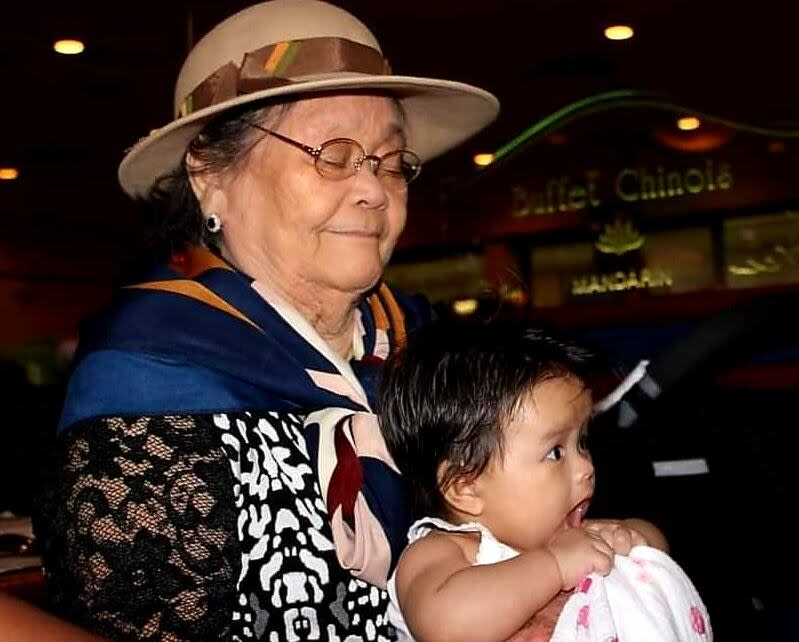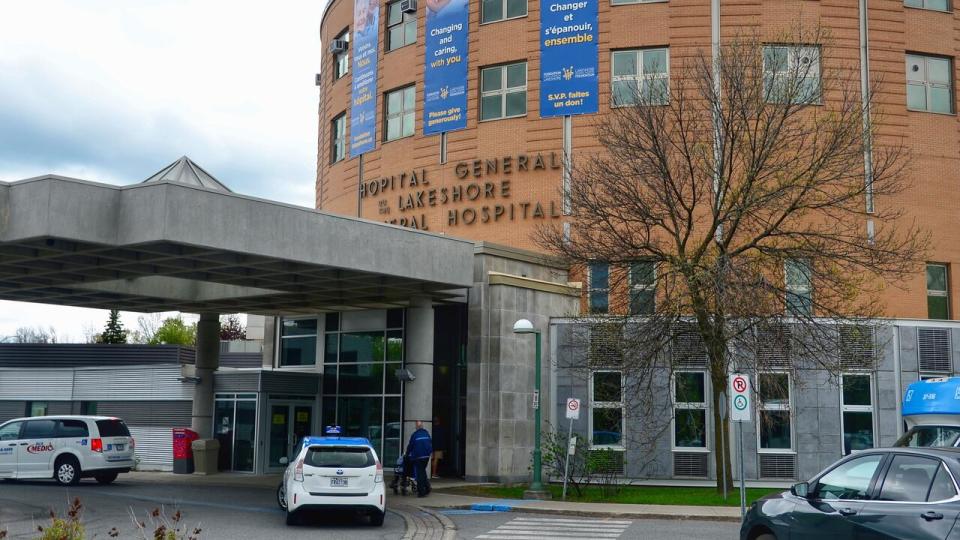Family of woman found dead on floor at Lakeshore General Hospital ER suing for $1M

The family of Candida Macarine, an 86-year-old woman who was found dead on the floor of a room in the ER at Lakeshore General Hospital in 2021, is suing the agency that oversees health care on Montreal's West Island for $1 million.
The lawsuit also names an ER doctor and a nurse at the Lakeshore as defendants.
"The medical services and care provided to the plaintiffs' mother throughout her stay at the hospital's ER were wholly inadequate, causing crucial, cumulative incidents that led to the avoidable death," the lawsuit filed last week alleges.

Staff at Lakeshore General Hospital initially didn't tell Candida Macarine's family about the full circumstances of her death. It was only when the family read a CBC News story about the incident that they realized their mother was the patient involved. (Submitted by Placido Macarine)
After the death, hospital staff only told Macarine's family she'd died of cardiac arrest. The hospital didn't tell the family Macarine had been found dead on the floor of an isolation room in the ER that had been flagged to managers as being problematic.
The night before her funeral, Macarine's children came across a CBC News story about an unnamed patient who died in that room. They quickly realized the story was about their mother.
"Staff at the hospital purposely and voluntarily concealed critical information from the family," the lawsuit alleges.
"As such, the defendant's staff wrongfully and negligently failed to inform the plaintiffs about pertinent facts leading to their mother's death" the lawsuit says.
The health agency — the Centre intégré universitaire de santé et de services sociaux (CIUSSS) de l'Ouest-de-l'Île-de-Montréal — issued a statement a month after the death apologizing for what it called "incomplete communications" with the family.
Lawsuit alleges several flaws in care
Macarine died a few hours after being admitted to the hospital with respiratory distress in February 2021.
She was found dead on the floor beside her bed in one of three negative-pressure rooms in the ER being used at the time for suspected COVID-19 patients.
Nurses had warned managers several times in the weeks before Macarine's death about difficulty looking directly into those rooms, making it hard to monitor patients there.
The family has been fighting to get clearer answers ever since. They pushed for a coroner's investigation, but ultimately found the results lacking. After the coroner refused to reopen the investigation, they requested their mother's complete medical file, and used both that and the coroner's report to build their case.
The lawsuit makes several allegations about flaws in Macarine's care during her short stay at Lakeshore the day she died, including:
Failure to check on her every 15 minutes as required based on her initial diagnosis.
Failure to adequately address two critical test results, troponin and blood gas, received earlier in her admission that should've been red flags to send her to the ICU immediately.
Failure of nurses at the nursing station to notice or react to audio and visual alarms that should have alerted them to Macarine's declining condition.
Contradictory notes from staff working that night as to the exact time a code blue was launched and when Macarine was found dead, raising questions about whether staff were slow to start CPR.
The lawsuit is seeking a total of $1 million: $100,000 for each of Macarine's eight surviving children and $100,000 for each of the families of two of her children who are deceased.
Assumptions about language
The lawsuit also alleges hospital staff made false assumptions about Macarine's knowledge of English.

According to the lawsuit, the first doctor who treated Macarine the night she died noted she spoke 'no English, no French.' The family says she spoke English, but was not wearing her hearing aid at the time she was admitted to the hospital. (Emmanuel Macarine)
The statement of claim says the ER doctor who first saw Macarine that night indicated in her notes that the patient spoke "no English, no French."
"The plaintiffs' mother spoke English but did not have her hearing aid with her," the lawsuit says.
"It is unclear how the defendant communicated with the plaintiffs' mother given this linguistic error, nor whether the nurses shared this assumption," the lawsuit says.
The family alleges that by failing to understand Macarine's linguistic abilities, the hospital contravened her right to information and communication.
'Pattern of negligence' alleged at ER
The lawsuit also alleges "a documented pattern of negligence at the hospital," citing a Montreal Gazette investigation about six troubling deaths in the ER since 2019.
In response to the Gazette story, Health Minister Christian Dubé commissioned an independent report on the hospital's emergency room, which recommended urgent renovations to protect patient safety.

A modular addition to the ER at Lakeshore General Hospital designed to improve patient safety is scheduled to open this spring. (Jean-Claude Taliana/CBC)
None of the allegations in the lawsuit have been tested in court.
Alexandre Cadieux, director of communications for the West Island CIUSSS, responded to CBC News in an email.
"The staff at the CIUSSS understand that these times are difficult for loved ones," Cadieux said, noting that CIUSSS management had met with the family.
Cadieux said the CIUSSS would not comment on the specific allegations in the lawsuit, but he said the CIUSSS has made several adjustments to improve the quality of care in the ER at Lakeshore, including:
Monthly meetings of experts to analyze adverse events and improve practices.
Integration of four nursing advisors specializing in emergencies to supervise and support new nurses, provide training and strengthen nursing practice.
Staff members designated to regularly monitor users at risk of falling making rounds every 15 minutes.
Cadieux also said as of next month the ER will be transferred to a new temporary modular building designed to add space, which he said would guarantee a modern and safe environment.
A full-scale renovation of the ER is still years away.
The Macarine family will hold a news conference with the Center for Research-Action on Race Relations on May 9 to talk about the lawsuit.

 Yahoo Sports
Yahoo Sports 